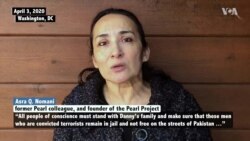The family of U.S. journalist Daniel Pearl, who was kidnapped and murdered in Pakistan in 2002, say they will appeal a decision by a Pakistani court this week that acquitted Ahmed Omar Saeed Sheikh and three others convicted of the murder.
“We absolutely, as Danny's friends and family, believe that the overturning of the convictions for murder is a great injustice to Danny,” said Asra Nomani, a close friend and former colleague of Pearl.
“We believe that it's a travesty of justice,” Nomani told VOA, adding that “Danny's family is investigating and appealing the decision.”
Pearl, 38, was a Wall Street Journal reporter covering Pakistani extremists when he was kidnapped in Karachi in January 2002 and was killed weeks later. Three men accused of involvement in the murder subsequently were convicted and handed sentences of life imprisonment, while the fourth one, British national Sheikh, was convicted and sentenced to death.
The four men had been in prison for 18 years until Thursday, when the high court in Sindh province overturned their convictions and decided to release them. Despite the ruling, the men remain in detention as Pakistani authorities Friday said they had “sufficient reason” to rearrest the men and hold them for three more months as the government announced it would challenge the court’s verdict.
WATCH: Pakistani court decision in Daniel Pearl case comes under scrutiny
Defense attorney Khwaja Naveed told VOA that Sheikh and the other three men, Fahad Naseem, Sheikh Adil and Salman Saqib, remained under-trial prisoners for two years while their appeals were pending for 18 years. He said the three men were acquitted, while Omar Sheikh’s conviction has been changed from murder to kidnapping, and his death sentence reduced to seven years in prison.
“Omar has spent 20 years in jail, two years as an under-trial prisoner and 18 years as a convicted prisoner. So, he has served 13 years above the sentence which was granted to him,” Naveed said.
US reaction
The court decision has been denounced by the U.S. government, with officials in Washington asking Pakistan to ensure accountability for those behind Pearl’s murder.
Alice Wells, the U.S. acting assistant secretary of state for south and central Asia, in a tweet Friday called Sindh’s overturning decision “an affront to victims of terrorism everywhere.”
In response, Pakistan’s Foreign Minister Shah Mehmood Qureshi said Friday that he was “really shocked” by Wells’ statement. He said the U.S. condemnation came as Pakistan was taking an effective role in fighting the coronavirus pandemic, while at the same time working to provide stability to the region by fighting terrorism and facilitating peace talks in Afghanistan.
“I believe the right to appeal can be issued by relevant parties. But this situation has raised unnecessary questions about Pakistan’s position,” Qureshi told Pakistan’s GEO News.
Pakistan’s stance
Pakistani officials say they are determined to follow due process to bring terrorists to justice. The Pakistani government late Friday in a statement said it was concerned about the provincial court’s decision and was going to file an appeal “in order to ensure that the ends of justice are met.”
Meanwhile, the Sindh provincial government’s Home Department said it ordered the rearrest of the four men for three more months, starting Thursday. A top Sindh official said the decision was made because of concerns the released men might act “against the interest of the country,” Reuters reported.
It remains unclear if the appeal will be heard next week, as Pakistan's court system has remained partially shut down because of the spread of the coronavirus.
Sindh’s prosecutor general, Faiz Shah, told VOA he was filing an appeal for homicide and ransom charges, stating that the case had “some infirmities.”
He added that the appeal could be challenged by “many technical faults and a defective investigation.”
“The most important thing is the FBI agent who appeared in the witness box and deposed. There is a serious contradiction in his statement, which the appellate court was really inspired by that piece of evidence,” said Shah.
The Pearl Project, an investigative journalism team led by Pearl’s colleague Nomani at Georgetown University, in a three-year investigation concluded that Pearl was beheaded and dismembered by Khalid Sheikh Mohammad.
Mohammad is believed to be the mastermind of September 11, 2001, terror attacks and is currently held at the U.S. Naval Base at Guantanamo Bay, Cuba. He initially claimed responsibility for beheading and dismembering Pearl, but he was never charged after his lawyers said his confession was made after he had been subjected to waterboarding.
VOA’s Muhammad Saqib and Khalil Ahmad contributed to this story from Karachi. VOA's Urdu service contributed to the story from Washington.










